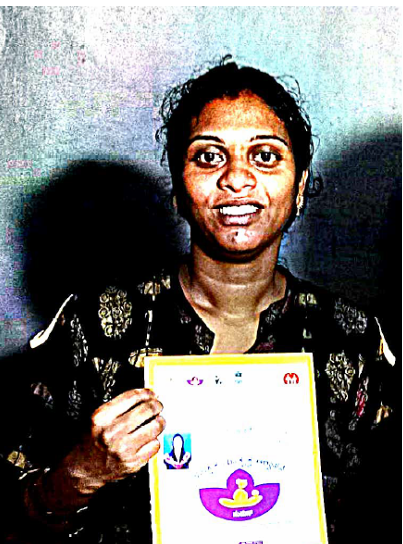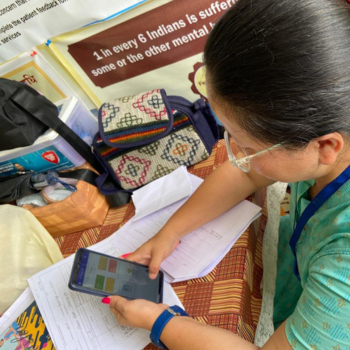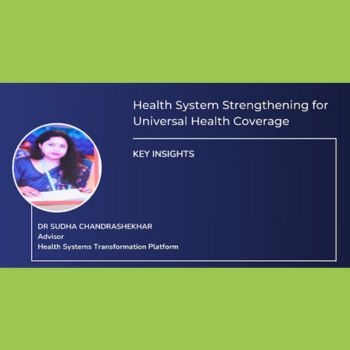Introduction: A Mother’s Tale of Mistrust and Misguidance
In the urban slums of Mandya, where misinformation about healthcare practices runs rampant and often leads to dire consequences for vulnerable families, stories of struggle and resilience are woven into everyday life. Among them, Manjula’s journey stands out. With a family marked by hardships and setbacks, she was determined to create a brighter future for her children. Yet, when it came to her health and family planning, she encountered a difficult choice between traditional advice from neighbors and the professional healthcare services offered by government health centers.
Misguided by unqualified sources and harboring initial mistrust in government healthcare, Manjula almost made a decision that nearly cost her unborn child’s life. Her story highlights the vital role community health workers play in building trust and providing accurate healthcare information. When she finally connected with frontline health workers and medical officers, a potential tragedy transformed into a testament to survival, strength, and support.
This reflects the Health Systems Transformation Platform (HSTP)‘s commitment to bridging the healthcare trust gap and delivering reliable and accurate information to underserved communities, empowering individuals to make informed, life-saving choices.
Background: A Life of Resilience
Growing up, Manjula shouldered responsibilities from a young age. After her father abandoned the family, her mother took up strenuous jobs to support Manjula and her siblings. Manjula’s younger brother struggled with addiction, and her family felt the weight of every challenge they faced. Despite these hardships, she remained determined to change her circumstances and give them a better life.
A graduate, Manjula secured a job that helped arrange her younger sister’s marriage, sacrificing her comfort to ensure her family’s well-being. In 2021, she married and soon gave birth to a baby boy. Hoping to plan their family responsibly, the couple decided to wait before having a second child.
Though educated, she faced cultural and social challenges that restricted her access to reliable health information. She relied on advice from neighbors who dissuaded her from using medically approved contraceptives. Instead, they encouraged her to adopt the Rhythm method—a far less effective and unreliable means of family planning.
Misguided by well-intentioned but unqualified advice, Manjula found herself facing an unexpected pregnancy. This reflects the consequences of widespread health misinformation in underserved communities and highlights the pressing need for trusted sources of healthcare guidance.
The Crisis: A Misguided Decision
Manjula’s neighbors and family friends cautioned her against medically reliable contraceptives, suggesting instead the Rhythm method, which they believed to be “safe” and “natural.” Without consulting qualified health workers, she followed this advice.
When she missed her menstrual cycle, she tested herself with an over-the-counter pregnancy kit, which gave her a negative result. Meanwhile, she developed a perforated eardrum and was prescribed medication for a month, unaware of the potential risks if she were pregnant.
Terrified and uncertain, she feared her baby might suffer anomalies. Distrusting government services, she initially sought advice from private practitioners who suggested she proceed with her pregnancy rather than opt for termination. Left with no other options, she turned to the very people she once avoided—community health workers and medical doctors at the local Urban Primary Health Center (UPHC).
The Turning Point: Rebuilding Trust Through HSTP’s Community Facilitators
Manjula’s perspective began to shift through her interactions with government healthcare providers. HSTP-trained and dedicated community facilitators provided her with trustworthy, accurate healthcare information. During their house visits, they spent time understanding her concerns, explaining the risks, and helping her consider her options.
Through compassionate and clear communication, they reassured Manjula, dispelling the misconceptions she held about government healthcare. This ultimately helped her decide to continue her pregnancy. One of HSTP’s core goals is to establish a trustful relationship between healthcare providers and communities—a goal that, in Manjula’s case, proved lifesaving.
Reflecting on the support she received, Manjula said:
“Had I known earlier that I could rely on them, I would not have gone through this alone. Their advice saved my child.”
With the guidance of a qualified government doctor, Manjula decided to continue with her pregnancy. She also opted to undergo a tubectomy after delivering her second child to ensure a stable and healthy future for her family.
Lessons Learned: Addressing Gaps in Health Literacy
Manjula’s story highlights the urgent need for health literacy and the imperative to dispel misinformation and refute harmful rumors within communities. HSTP remains committed to tackling such gaps through
• Enhanced Health Literacy: Expanding programs that promote reliable health information and foster health literacy at both community and individual levels.
• Trusted Communication Channels: Leveraging social and mass media to counteract misinformation, especially regarding Comprehensive Primary Health Care (CPHC) and Reproductive, Maternal, Newborn, Child, and Adolescent Health (RMNCH+A) services.
• Reducing Out-of-Pocket Expenditure (OOPE): Encouraging families to access services through UPHCs, thus lowering OOPE.
Conclusion: A Healthier Tomorrow for Mothers Like Manjula
Manjula’s story ends on a hopeful note. Today, she is preparing to welcome her second child, buoyed by the reassurance that she now has a dependable healthcare system on her side that is easily accessible, affordable, and available. Through the collaborative efforts of community facilitators, frontline workers, and medical officers, HSTP’s initiative provided her with life-saving support when she needed it most.
Her journey reminds us that accurate, professional healthcare advice is not merely beneficial—it is essential. By investing in public trust and accessible health education, HSTP aims to change the narrative for women like Manjula, ensuring that they have the knowledge and confidence to make the best decisions for their families’ well-being.
As we leave Manjula in her home, basking in the glow of her pregnancy, she expresses heartfelt gratitude for HSTP’s support. “I had always thought these centers were just for minor issues. I never knew they would genuinely care about my family and support me through such a critical time,” she says.



